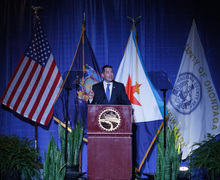Roth: Stereotypes influence Chileans’ views of American people
A Chilean friend led the mix of Americans and Chileans to a restaurant for my friend’s birthday celebration. He claimed the place was super cheap and of good quality, even though it was always empty. My American friend and I were talking about how we hope the place is actually cheap, when our Chilean friend interrupted us.
“But you guys are rich ‘gringas’ (Americans). Isn’t it all the same to you?” he said in Spanish.
We were dumbfounded. This was the first time someone has called me out on this stereotype. At first, I was offended. But afterward, I realized that some stereotypes are just that — stereotypes — while others may have more meaning behind them. Whether or not we’re right, Chileans will make assumptions about me, and I have made my own assumptions about their culture.
Before his comment, I had assumed that he was upper or middle class because his university’s student body has the reputation of being snobby and upper class. Even so, I’ve met students from many different backgrounds at this school.
In the United States, I’m not rich. I come from a middle class background. I’ve been working since my junior year of high school. And — here’s the kicker — I’m paying for the majority of my trip on my own.
My Chilean friend couldn’t have known all of that. He knew I had money for a plane ticket and that I come from a country with a higher gross domestic product. When your interaction with American culture is through glamorous movies and tourists taking expensive trips, it’s easy to think that all Americans have loads of money.
Maybe I actually am rich in this country, since my family’s income is greater than the average Chilean’s. The average family’s income in the United States is about $25,700 more than the average Chilean family’s income, according to the Organization for Economic Co-operation and Development’s data. In some ways my friend’s assumption was valid, even though I don’t consider myself to be rich in the States. However, wealth is relative, just like other stereotypes.
Take, for example, the stereotype that Americans have cold dispositions. Conversely, I think Chileans have very warm personalities. Women greet each other with a kiss on the cheek and men greet each other with a handshake. If you run into someone in the street, you do the greeting — once to say hello and again to say goodbye. If two people know each other well, this greeting turns into a hug or a pat on the back. For me, the kiss on the cheek shifts awkwardly into a hug that I still don’t expect.
Chileans are touchier in general. In conversation, they’ll touch me on the shoulder or the arm. In the States, it would probably be construed as flirting. While at lunch or evening tea, my host dad would put his arm around my host mom. My host brother embraces my mom and dad and stands with his arms around their shoulders. I’m not a very touchy person for U.S. standards, so I’m sure people perceive me as cold.
Even though these stereotypes are generalizations of a culture — so they obviously won’t all apply to me — the stereotype of fat Americans can bother me. I feel like my more conservative host grandmother stares at what I eat during our Sunday teas. Tea happens during an American’s dinnertime, but bread, cake and tea are served.
The past few Sundays, I’ve arrived for tea after a day of traveling or hiking, so I missed the huge lunch that my family normally has. When I get to the tea, I am starving. I’ll eat more cake and bread than the rest of the family, and my grandmother gives me judgmental looks with every slice of bread I take.
I’d like to explain my situation to them — I’m used to eating a meal for dinner, I’m hungry from traveling, I hadn’t eaten lunch — but maybe I’m making an assumption about her. Maybe I perceive her looks as judgmental when she is just curious about this new person at the dining table.
Stereotypes are a two-way conversation. I make assumptions about Chileans just like they make judgments about me. However, this conversation would be a lot easier if Spanish had a word for awkward.
Danielle Roth is a junior majoring in magazine journalism and international relations. She is following her desires for good food and adventure in Santiago, Chile. Email her at dlroth@syr.edu or tweet at her @danielleroth_.
Published on October 21, 2014 at 12:01 am





